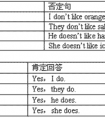用括号内所给动词的适当形式填空1. I am sorry ___________ (hear) that your mother was ill yesterday.2. After finishing ___________ (do) her homework, Lucy went -八年级英语
3.作形容词的宾语
The music is well worth listening to more than once. 这种曲子很值得多听几遍。
We are busy preparing for the coming sports meet. 我们正为马上到来的运动会忙着做准备。
三、动名词作表语
动名词作表语时句子主语常是表示无生命的事物的名词或what引导的名词性从句。
表语、动名词与主语通常是对等的关系,表示主语的内容,主语、表语可互换位置。
Your task is cleaning the windows. 你的任务就是擦窗户。
(Cleaning the windows is your task.)
What I hate most is being laughed at. 我最痛恨的就是被别人嘲笑。
(Being laughed at is what I hate most.)
四、动名词作定语
动名词作定语往往表示被修饰词的某种用途。如:
a walking stick =a stick for walking=a stick which is used for walking
a washing machine=a machine for washing=a machine which is used for washing
a reading room=a room for reading=a room which is used for reading
a measuring tape=a tape for measuring=a tape which is used for measuring
sleeping pills=pills for sleeping=pills which is used for sleeping
动名词也有时态和语态的变化,如表所示(以及物动词write为例),不及物动词没有语态的变化。
| 时态、语态 | 主动 | 被动 |
| 一般式 | writing | being written |
| 完成式 having written |
having been written |
1) 动名词做主语时,谓语动词为单数
2) 在动名词和不定式中,作为介词的宾语是动名词
3) 动名词的否定直接在其前加否定词,通过代词的宾格或所有格形式给出逻辑主语
例:I would appreciate you calling back this afternoon.
4) 有些词后只能接动名词
acknowledge;admit; advise;advocate;allow;appreciate; avoid; celebrate; consider; contemplate; defer; delay; deny;
detest; discontinue; dislike; dispute; enjoy; it entails; escape; excuse; explain; fancy; feel like; finish; forgive; can’t help;
hinder; imagine; it involves; keep; it means; mention; mind; miss; it necessitates; pardon; postpone; practice; prevent;
recall; report; resent; resist; risk; suggest; understand...
5) 另外还有一些接-ing形式的常用说法
it’s no good; it’s no/little/hardly any/ use; it’s not/hardly/scarcely use; it’s worthwhile; spend money/time; there’s no;
there’s no point in; there’s nothing worse than; what’s the use/point
6) 有些词后面加不定式和动名词均可
remember,forget,try,stop,go on,continue,stop,regret,cease,mean后面均可用不定式和-ing形式,但意义截然不容。
例:remember to do/doing:
①I remembered to post the letters.(指未来/过去未来将要做的动作)
②I remembered posting/having posted the letters.(我记得做过这个动作)
forget与remember的用法类似。
regret的用法:
①I regret to inform you that…(我很遗憾地通知你……)
②I regretted having left the firm after twenty years.(为了“二十年前的离开”而遗憾。)
try to(努力)与try +–ing(试验):
①You really must try to overcome your shyness.
②Try practicing five hours a day.
考点名称:一般将来时
一般将来时:
表示将来某一时刻的发生动作或状态,或将来某一段时间内经常的动作或状态。
一般句型有:
肯定句:
I/We shall/will go. You/He/She/They will go.
否定句:
I/We shall/will not go. You/He/She/They will not go.
疑问句:
Shall I/we go? Will you/he/she/they go?
简略回答:
(肯)Yes,主语shall/will (否) No,主语 shall/will not
特殊疑问句:
一般将来时的特殊疑问句是将疑问词放在句首,后接一般疑问句(就主语提问时,以疑问词who开头的疑问词除外)
Why will you be here on Sunday?(周日你为什么将要在这儿?)
I will have a meeting on Sunday(我将要在周日举行一个聚会)
(对特殊疑问句要进行具体回答)
一般疑问句:
be或will提到句首,some改any,and改or,第一二人称互换
We are going to go on an outing this weekend.
Are you going to go on an outing this weekend?
被动句:
will/shall+be+v.ed(及物动词过去分词)
The letter will be sent tomorrow.
这封信明天将寄出去
We shall be punished if we break the rule.
如果我们违反规定,我们将受到惩罚。- 一般将来时的构成:
1. 用will或shall表示
“助动词will或shall+动词原形”这一形式,表示将来发生的事情,用于征求对方的意见或表示客气的邀请。在口语中will用于所有人称,书面语中第一人称常用shall,如:
①Tomorrow will be Sunday. 明天就是星期天。
②The rain will stop soon. 雨很快就要停了。
③Shall we go there at five? 我们五点钟去那儿,好吗?
④Will you please open the door? 请你把门打开,好吗?
2. 用be going to结构表示
“be going to+动词原形”用来表示近期或事先考虑过的将要发生的动作以及已有迹象 表明必将发生某事,意为“打算;就要”。如:
①We’re going to meet outside the school gate. 我们打算在校门口见面。
②Look! It's going to rain. 瞧!快下雨了。
3. 用现在进行时表示
表示位置转移的动词(如:go, come, leave, start, arrive等),可用现在进行时表示将来时。如:
①Uncle Wang is coming. 王叔叔就要来了。
②They’re leaving for Beijing. 他们即将前往北京。
4. 用一般现在时表示
根据规定或时间表预计要发生的动作,在时间和条件状语从句中,都可用一般现在时表示将来时。如:
①The new term starts (begins) on August 29th. 新学期八月二十九日开学。
②If it doesn’t rain tomorrow, we will go out for a picnic.
如果明天不下雨,我们将出去野餐。
5. 用“be+动词不定式”或用“be about to +动词原形”的结构表示,如:
①He is to visit Japan next year. 明年他将访问日本。
②They’re about to leave. (=They’re leaving.) 他们就要走了。 be going to与will的区别:
be going to与will两者都可表示将要发生的事、将要去做某事,但它们有如下几点区别:
1. be going to 表示近期、将要发生的事情,will 表示的将来的时间则较远一些,如:
He is going to write a letter tonight.
He will write a book one day.
2. be going to 表示根据主观判断将来肯定发生的事情,will表示客观上将来势必发生的事情。
He is seriously ill. He is going to die.
He will be twenty years old.
3. be going to 含有“计划,准备”的意思,而 will 则没有这个意思,如:
She is going to lend us her book.
He will be here in half an hour.
4.在有条件从句的主句中,一般不用 be going to, 而多用will, 如:
If any beasts comes at you, I'll stay with you and help youshall和will区别:
1.shall和will常常缩写成'll,紧接在主语之后。其否定式 shall not 和will not 的缩写式分别为 shan't 和 won't。
基本句型:
be to表示客观安排或受人指示而做某事。后+动词原形。
be about to+动词原形,意为马上作某事,不能与tomorrow,next week等表示明确将来时的时间状语连用。
2.will和shall在句子中所表达的“意志”是不同的,当句子主语是第一人称(I)的时候表示的是主语 I 的自主“意志”。
例:I will be clear tomorrow . 我会把这件事弄个水落石出
分析:这个句子中用will时,主语 I(我) 就带有强烈的意志,意思是我想让事情水落石出,并且有我会为此付诸努力的意思。
3.当第一人称,用shall的时候就是一个普通的句子,就没有主语的意志。
I shall come back in ten minutes .这句话就是单纯的说 我会在10分钟后回来 没有别的意思
I will come back in ten minutes. 而这句话就有一种意境上的不同。
我会在10分钟后回来,其中的意思还有,就算我有事耽搁了我也会想办法在10分钟后回来的意思
4.shall在第二 、三人称时也和will在第一人称一样。也只有在二三人称才带有意志,只不过shall带有的是“说话者”的意志。而不是主语的意志。
- 最新内容
- 相关内容
- 网友推荐
- 图文推荐
| [家长教育] 孩子为什么会和父母感情疏离? (2019-07-14) |
| [教师分享] 给远方姐姐的一封信 (2018-11-07) |
| [教师分享] 伸缩门 (2018-11-07) |
| [教师分享] 回家乡 (2018-11-07) |
| [教师分享] 是风味也是人间 (2018-11-07) |
| [教师分享] 一句格言的启示 (2018-11-07) |
| [教师分享] 无规矩不成方圆 (2018-11-07) |
| [教师分享] 第十届全国教育名家论坛有感(二) (2018-11-07) |
| [教师分享] 贪玩的小狗 (2018-11-07) |
| [教师分享] 未命名文章 (2018-11-07) |


![Sunday is my birthday. I would like _____ a birthday party, would you _____to my party? [ ]A. have; come B. to have; to come C. have; to come D. to have-七年级英语](http://www.00-edu.com/d/file/ks/4/2/budingshi/2020-01-08/smalla85122db0c71d7fb6ae58187be7f1fd11578430330.png)

![Why areyou here? You are supposed ______ in the classroom now. [ ] A. to studyB. to be studiedC. studying D. to be studying -九年级英语](http://www.00-edu.com/d/file/ks/4/2/budingshi/2020-01-08/small6dee02daa62cac1c71853ac804ab4fbd1578422460.png)
![She is very poor. Little food _____ and no room _____! [ ]A. to eat, to live B. to eat, to live in C. eating, living -八年级英语](http://www.00-edu.com/d/file/ks/4/2/budingshi/2020-01-09/small17b77c2697a3ef8f1461d0d14b016ee51578585185.png)
